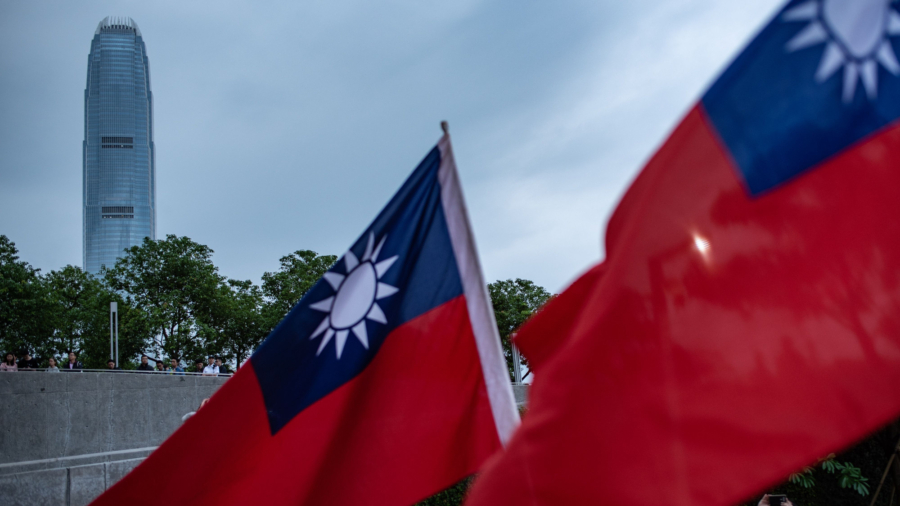Further evidence from Taiwanese authorities has been put forward on Nov. 26 in an investigation involving two business executives accused of spying for the Chinese regime to interfere with Taiwan and Hong Kong autonomy.
Xiang Xin and his wife, Kung Qing, who are the executive director and alternate director respectively of the Hong-based company China Innovation Investment Ltd (CIIL), were stopped at Taiwan’s Taoyuan International Airport in Taipei on Nov. 24 as the two tried to leave the country.
Taipei investigators have been questioning the couple under suspicion of violating Taiwan’s National Security Act, confiscating their phones. Authorities have also issued a ban prohibiting the pair from leaving Taiwan.
The investigation arose following allegations from Chinese national Wang Liqiang who defected to Australia, claiming to be an intelligence agent for the ruling Chinese Communist Party (CCP).
In a sworn statement to the Australian counterintelligence agency, Wang—who has now filed asylum claims—alleges that Xiang and Kung are both intelligence officials with close ties to China’s military. Wang said that CIIL, which he began working for from 2014, acted as a major front for the Chinese regime to conduct overseas espionage, including sabotage of the ongoing pro-democracy and anti-CCP protests in Hong Kong.
Prosecutors said that the two frequently visited Taiwan and have purchased two properties in Taipei worth hundreds of millions of Taiwan dollars (100 million Taiwan dollars is about $3.28 million).
Both Xiang and Kung denied ever meeting with Wang as well as the allegations about their involvement in espionage activities. The CIIL issued a statement on Nov. 24, renouncing Wang’s claim that he has been their employee.
The Taipei Prosecutors’ Office summoned the couple twice on the morning of Nov. 27 for questioning for about two hours. Both declined to speak to the media afterwards.
Military Ties
In December 2016, Xiang and Kung applied to establish an investment firm in Taiwan with 100 million Taiwan dollars (about $3.28 million) but the Investment Commission denied the request for “national security concerns,” according to a Nov. 25 press release from the commission. Shen Jong-chin, Taiwan’s Minister of Economic Affairs, told local media on Nov. 26 that the consideration was largely due to the pair’s close military ties.
Chinese media reports from 2008 showed that CIIL entered into several contracts with the state-owned defense corporation Norinco and secured deals on multiple aerospace projects in the mainland. The U.S. administration has imposed sanctions against Norinco for allegedly selling missile technology to Iran.
The company’s profile on the Stock Exchange of Hong Kong describes it as an investment company principally focused on “dual usage of military and civil sectors.” Kung herself also worked for the China Defense Science and Technology Information Center, which is under the science and technology committee for the Central Military Commission.
“If [the request] was denied in 2016 for national security, how come Xiang Xin is still allowed to run around Taiwan in the past few years?” Yen Ming-wei, the spokesperson for the Taiwan Statebuilding Party, said in a Nov. 26 press conference.
Kao Cheng-yan, founding chair of the Green Party Taiwan and a member of the Taiwan Environmental Protection Union, said that CIIL had contacted him in 2017 hoping to invest 500 million Hong Kong dollars (about $16.39 million) into his company, Lanyang Geothermal Corp., but he refused the partnership. Speaking to media on Nov. 26, he said he felt lucky to have made the right decision.
“They would have gotten the approval from the Investment Commission because of the partnership,” he said. “I would have gotten the funding I needed, but I’d be miserable today.”
Chen Po-wei, a political candidate for the same party, urged the government to investigate “what Xiang has done over the past years in Taiwan.” He said that Xiang’s company had invested over 31.5 million Hong Kong dollars ($4.02 million), and questioned the whereabouts of the money.
“I think for Taiwan’s intelligence department and the government to do this, it’s no joking matter,” Xia Yeliang, a political and economic commentator originally from China, told The Epoch Times’ sister media NTD.
Beijing’s Response
Speaking at a regular news briefing, Zhu Fenglian, spokeswoman for China’s Taiwan Affairs Office, repeated that Wang was a fraudster who carried fake travel documents.
“Actually the facts are clear for this ‘fraud who became a spy.’ This is a totally absurd, loophole-ridden ‘screenplay’ concocted by anti-China forces,” she said.
“The DPP authorities and the fraudster have bandied together, wantonly carrying out political manipulation,” Zhu said. “Their intention is to create the illusion of the mainland getting involved in the Taiwan regional elections and obtain improper election benefit for themselves.”
Taiwan President Tsai Ing-wen wrote on her Facebook page on Tuesday that Beijing infiltration into Taiwan’s society and election meddling are “happening all the time” and cannot be taken lightly.
“The democracy we enjoy comes after several generations’ consistent hard work. Each of us has a responsibility to stand up and defend democracy and freedom that belong to Taiwan,” she wrote.
From The Epoch Times


